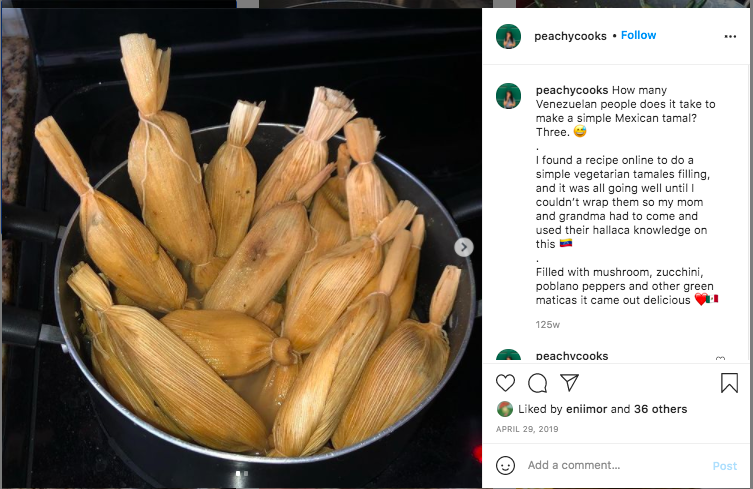One of the most common reasons people may feel hesitant to remove meat and dairy from their diets is a fear of the major change it could bring to their lifestyle. In many cultures, meat and animal products are the core of traditional cuisine. Some may be unwilling to lose that aspect of their cultural identity in a sense.
Even so, many individuals with plant-based diets have found ways to stay in touch with their cultural backgrounds by cultivating alternatives to their favorite home-cooked meals without animal products.
Enid Moreira, 25, started her journey with plant-based foods in 2018 using social media influence as a tool. Moreira said her Venezuelan background has played a huge role in her personal identity, but it also proved to make her changing diet more difficult to manage in the beginning.
Though Venezuelan cuisine may vary according to region, some common staples in the country include corn, rice, plantains, beans and meat. Popular Venezuelan dishes include pabellón criollo (shredded beef and rice) and hallaca (corn dough stuffed with meat and other ingredients).
“Since 2020, I have been following this pescatarian diet in which I primarily eat plant-based, especially when I am cooking for myself, but depending on the setting, I will adjust my diet.”
Moreira’s diet, which mainly consists of vegetables, legumes, and fish, is an example of a “flexitarian” diet, a term used to describe a semi-vegetarian diet when one mainly eats plant-based, but occasionally consumes a type of meat depending on the situation or food availability. This is a common first step for individuals who are just starting to change their eating habits.
“In the beginning, it was a bit hard for me because it took a lot of educating on my own to learn how to be mindful that I was getting all the nutrients I needed,” she said. “Nobody taught me the nutritional value of a red bell pepper, but now I know because I took the time to learn.”

On an Instagram page dedicated to her home-cooked cuisine, @peachycooks, Moreira has shared countless plant-based meals from various cultures, such as Thai red curry, cauliflower tacos, shepherd’s pie, and spicy braised tofu.
“If I am cooking, I will cook enough for everyone because I do not want it to be a me-thing, but more as a way to share with [my family] that what I was eating was delicious — please join me!” Moreira said.
Moreira believes it is possible to maintain cultural expression while eating plant-based meals, but it is also important to not give up compassion when considering others who are unwilling to change their diet as well.
“My advice to anyone interested in starting a plant-based diet would be to just take it easy,” she said. “It takes time and it’s a whole adjustment if you’re not raised in a plant-based family; you’re unlearning everything you’ve been taught about food. Be kind to yourself and stay flexible — it’s about you and the choices you’re making for the environment.”
For many plant-based consumers, like Moreira, the addition of mock meats from brands like Impossible Foods and Beyond Meat has made it easier to recreate some of their favorite traditional dishes, such as picadillo and tamales. These mock meats, made mostly of soy or pea protein, have become popular with consumers around the world, with products sold in chain restaurants such as Pollo Tropical, Starbucks, and even at the Disney Parks.
For more information on some culturally diverse vegan restaurants in your area, click here!
Emily Cruz, 26, is a vegetarian who has found ways to stay connected to her culture while eating mostly plant-based foods. Originally from Honduras, Cruz explained that though her diet has had an impact on the way she is able to enjoy meals with her family, they have still been able to find ways to adjust their traditional cuisine with substitutes to accommodate her diet.
Traditional Honduran meals often incorporate Mesoamerican, Spanish, Caribbean and African cuisines; some of the country’s specialty dishes include fried fish, tamales, carne asada (beef), and baleadas (flour tortilla with refried beans and cheese).
She explained her family was hesitant about the change in her diet at first because of the important role food plays in her culture. Cruz and her family now believe it is possible to maintain cultural connections through cuisine while eating plant-based food, but it was not easy at first.
“The holidays are still the hardest for me because my extended family questions or jokes about me being vegetarian,” Cruz said. “However, I am so thankful my mother made efforts to make some Honduran dishes vegetarian for me! My favorite is our version of enchiladas. The base of this dish is ground beef, but [we] use frijoles molidos (refried beans) as the base for the vegetarian version!”
Unlike Moreira and Cruz, Amy Neira, 24, started a vegan diet in 2015 and has been going strong with her completely plant-based diet since then. The Cuban-American has been able to cultivate her favorite family dishes by making them more plant-based and nutritionally balanced.
“Rice and beans have always been a staple and a lot of non-meat-centered dishes are accidentally vegan the way my family prepares them,” Neira said.
She explained her culture made her experience seem easier since Cuban traditional foods already incorporate many vegan-friendly foods, but there are still some popular dishes centered on meat, such as ropa vieja (beef), arroz y frijoles negros (rice and black beans), and lechón asado (roast pork).
“Meat is a side to add to your [meal], while rice and beans are always the main thing, so it was just a matter of not adding it to my plate anymore and skipping lechón on Christmas.”
Neira described her culture’s cuisine to be heavily based on the inclusion of sides like salads, yucca, malanga, pumpkin, and eggplant dishes, which are typically spiced with sofrito as the seasoning.
“My family definitely found it weird and unhealthy at first, but they’ve come to understand and accommodate over the years,” she said. “As the years have passed, I’ve become more fluid with my lifestyle and I take a more nuanced and enjoyable approach.”
As plant-based diets continue to be popularized, it is easier than ever to find information and recipes to change in a healthy and realistic way. Enid Moreira, Emily Cruz, and Amy Neira may have different lifestyles and identities, but they are living proof that it is possible to recreate your favorite dishes in a plant-based fashion and still keep in touch with your cultural roots.
































